中西方宗教文化差异_(英文)
- 格式:ppt
- 大小:1.56 MB
- 文档页数:20
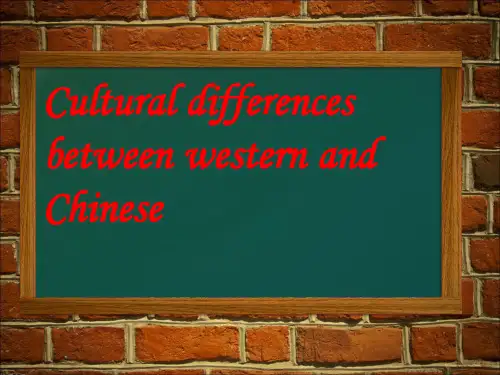
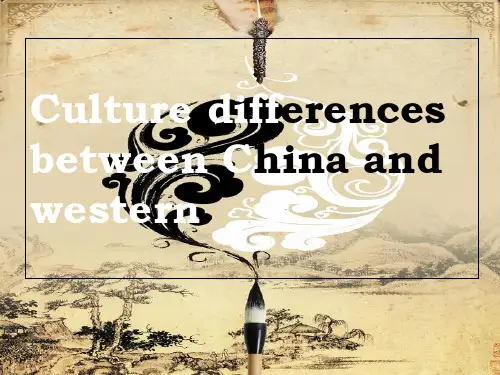
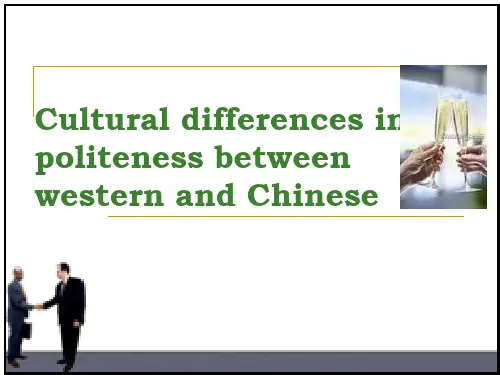
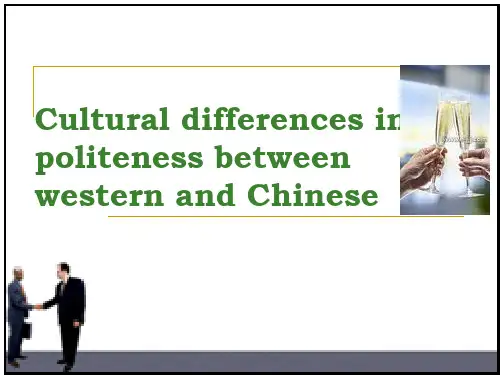

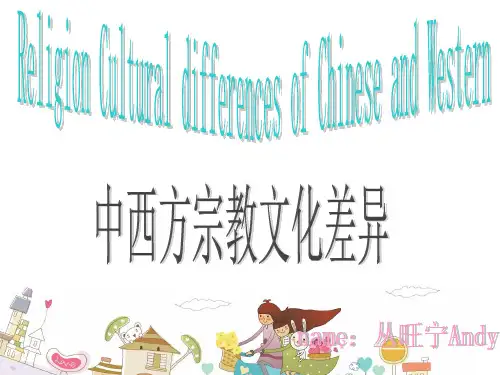
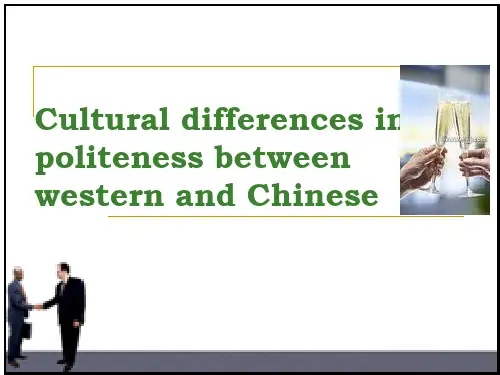
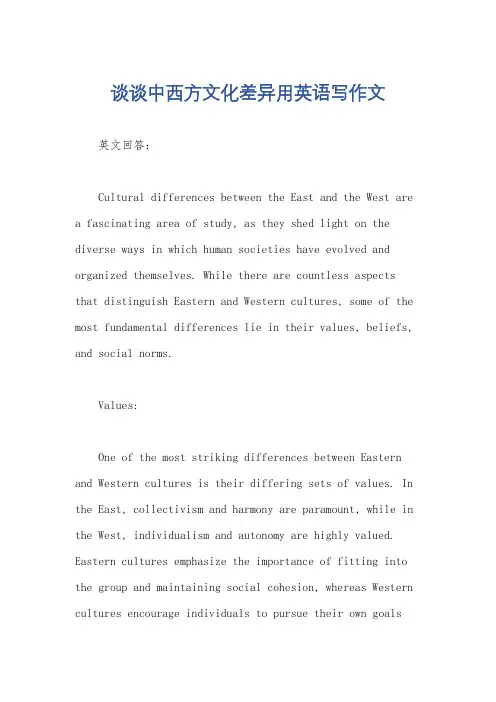
谈谈中西方文化差异用英语写作文英文回答:Cultural differences between the East and the West are a fascinating area of study, as they shed light on the diverse ways in which human societies have evolved and organized themselves. While there are countless aspects that distinguish Eastern and Western cultures, some of the most fundamental differences lie in their values, beliefs, and social norms.Values:One of the most striking differences between Eastern and Western cultures is their differing sets of values. In the East, collectivism and harmony are paramount, while in the West, individualism and autonomy are highly valued. Eastern cultures emphasize the importance of fitting into the group and maintaining social cohesion, whereas Western cultures encourage individuals to pursue their own goalsand desires.Beliefs:Another fundamental difference lies in the religious beliefs and spiritual practices that prevail in each region. Eastern cultures are heavily influenced by Easternreligions such as Buddhism, Confucianism, and Taoism, which emphasize concepts of karma, reincarnation, and the interconnectedness of all things. Western cultures, on the other hand, are rooted in the Judeo-Christian tradition, which places a strong emphasis on monotheism, personal salvation, and the separation between humans and God.Social Norms:The social norms and customs that shape daily life in Eastern and Western cultures also differ significantly. In the East, there is a strong emphasis on respect for authority, hierarchy, and tradition. Individuals are expected to conform to social expectations and avoidcausing shame to their family or community. In the West,social norms are more egalitarian, and individuals are encouraged to question authority and express their own viewpoints.Communication:Communication styles also vary between Eastern and Western cultures. In the East, communication tends to be indirect and implicit, with a focus on non-verbal cues and subtle hints. In the West, communication is often more direct and explicit, with a strong emphasis on clarity and efficiency.Time Perception:Another notable difference is in the way that Eastern and Western cultures perceive time. Eastern cultures tend to view time as cyclical and fluid, while Western cultures view it as linear and finite. This difference can manifest in various aspects of life, such as attitudes toward work, leisure, and personal relationships.These are just a few examples of the countless cultural differences that exist between the East and the West. These differences shape everything from the way that people interact with each other to the way that they view theworld around them. Recognizing and understanding these differences is crucial for fostering mutual respect and cooperation between cultures.中文回答:文化差异。
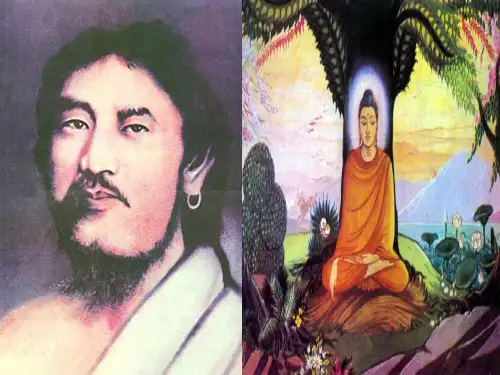
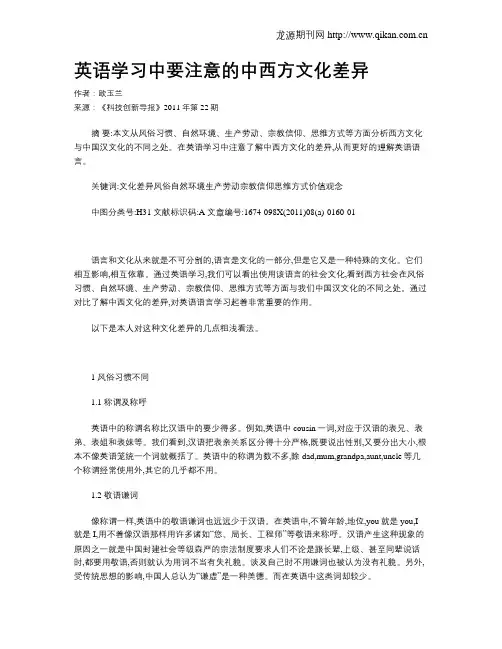
英语学习中要注意的中西方文化差异作者:欧玉兰来源:《科技创新导报》2011年第22期摘要:本文从风俗习惯、自然环境、生产劳动、宗教信仰、思维方式等方面分析西方文化与中国汉文化的不同之处。
在英语学习中注意了解中西方文化的差异,从而更好的理解英语语言。
关键词:文化差异风俗自然环境生产劳动宗教信仰思维方式价值观念中图分类号:H31 文献标识码:A 文章编号:1674-098X(2011)08(a)-0160-01语言和文化从来就是不可分割的,语言是文化的一部分,但是它又是一种特殊的文化。
它们相互影响,相互依靠。
通过英语学习,我们可以看出使用该语言的社会文化,看到西方社会在风俗习惯、自然环境、生产劳动、宗教信仰、思维方式等方面与我们中国汉文化的不同之处。
通过对比了解中西文化的差异,对英语语言学习起着非常重要的作用。
以下是本人对这种文化差异的几点粗浅看法。
1 风俗习惯不同1.1 称谓及称呼英语中的称谓名称比汉语中的要少得多。
例如,英语中cousin一词,对应于汉语的表兄、表弟、表姐和表妹等。
我们看到,汉语把表亲关系区分得十分严格,既要说出性别,又要分出大小,根本不像英语笼统一个词就概括了。
英语中的称谓为数不多,除 dad,mum,grandpa,aunt,uncle等几个称谓经常使用外,其它的几乎都不用。
1.2 敬语谦词像称谓一样,英语中的敬语谦词也远远少于汉语。
在英语中,不管年龄,地位,you就是you,I 就是I,用不着像汉语那样用许多诸如“您、局长、工程师”等敬语来称呼。
汉语产生这种现象的原因之一就是中国封建社会等级森严的宗法制度要求人们不论是跟长辈,上级、甚至同辈说话时,都要用敬语,否则就认为用词不当有失礼貌。
谈及自己时不用谦词也被认为没有礼貌。
另外,受传统思想的影响,中国人总认为“谦虚”是一种美德。
而在英语中这类词却较少。
1.3 个人隐私对大多数西方人来说,向陌生人或不太熟悉的人提出的如“How old are you? Are you married?How much do?you make?”等谈及年龄、婚姻状况等问题的话题属个人隐私范畴,忌讳别人问及。
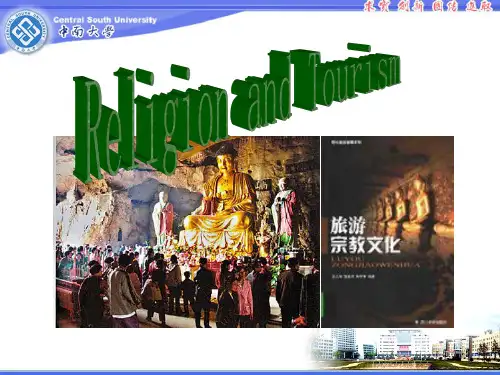
THE DIFFERENCEs BETWEENCHINESE TRADITION RELIGIONAND FOREIGN RELIGIONProduce BY ZY-LOFTER StudioBibliography and AuthorThe Story of the World by Susan Wise Bauera Global History by Leften Stavros StavrianosEditing and Production by Victer M.LeeDirectory1.CHINESE TRADITION RELIGION2. FOREIGN RELIGIOUS(1)Catholic(2)Puritan3. Summarized那个,暂时用一下中文哈~~以下内容涉及哲学,以及一些比较深远的东西,我怕我的小心脏受不了,先用一下中文,不过放心,到了西方我还是会用英文的,哇哈哈哈哈哈哈哈哈哈哈哈哈哈中国传统传统宗教的三大特点1、不发达性。
梁启超说:“中国人迷信宗教之心,素称薄弱,《论语》曰:‘未能事人,焉能事鬼;未知生,焉知死’盖孔子之大义,浸入人心久矣。
”在这段话中,既指出中国人宗教观念淡薄这一特点,同时也找到了产生这一特点的原因。
中华民族在佛教没有传入中国以前,没有一个有组织的宗教,人们只是相信“天命”,信奉天上和地上的神祗,信奉最高的神灵上帝,因为人的生命吉凶全操在上帝和神祗的掌握中,因而乃有命运的信仰。
孔子说他“五十而知天命”,孟子乃主张“修身以立命”。
中国人从古到今,都怕得罪上天,孔子曾经说:“获罪于天,无所祷也。
”天命的思想,又造成中国政治制度上一个很重要的观念,就是皇帝受天命而王,代天行道,每一位皇帝在继承皇位时,必定说自己是“承天启运”,因而自称天之子。
这种近似宗教,又不是宗教的天命思想,从先秦至秦汉,已牢牢地占据了中国人的心灵。
周代以来还有一种思想左右着人们,那就是“天命靡常,惟德是辅”,皇帝在代天行道的同时,一定要注意自己的德政如何,若是不好就要受到上天的惩罚。
中西宗教观之比较AbstractThere are over 80 % of people are religious in the west , while in China , there are about 90 % are non-religious .What makes so big a contrast ? We can only get the answer when we take a look at the following aspects and then make an analysis to them :mode of thinking , point of vault , view to god and human , view to the eternity , the role of religion in a society , regality and divine authority as well as the relation between philosophy and religion .From the analysis we can see that there are vast diversity between China and the west world among those aspects listed above .It is the difference that makes different view and different attitude to the religion between Chinese people and the people in the west .Key words: view to the religion comparison study diversityA Comparison between Chinese and Western View ofReligionIntroductionAccording to a statistical data of the last century, the world population of more than 5.89 billion, of which 4.8 billion people of faith to participate in more than 1500 different religious denominations and religious activities. That is, in the world's population, more than 80% of the people are religious believers. While China In contrast, more than 90% are not religious believers. How formed huge gap? In this regard, Chinese and foreign scholars of common concern. Early in 1922 published "China's problems," a book, Russell said: "China is simply no religion, not just the upper classes so, but all the people alike."In religious terms, why is there such a big difference between China and western? Originally, beyond this life for the pursuit of human born with the desire to do Chinese people it is a special case?This paper tries to talk about the reasons why Chinese people is indifferent to religions concepts from Chinese and Western cultures and the view of religions.I.The differences on thinking structureIn the initial stage of the human mind, chaos, intuitive way of thinking and perception of integrity, is a common feature of human thinking. However, the ancient Greek as the representative of the West, "the development of a limited overall concept is the concept of material and form an entity separate from, and attribute analysis method", which "led to the traditional ideological origins of modern science." "And the ancient Chinese developed a holistic view of all things infinitely continuous communication, Dahua popular consciousness or an organic whole, the subject is more important than the specific analysis and understanding capabilities." Thus lanes of Western thinking, leading to subsequent differences in ways of thinking, customs and mental performance methods, etc. area. For example, Chinese people are accustomed to intuitive, symbolic way of thinking, so it tends to be more often the expression mystery from concrete, tended to by a realistic impressionistic; and Westerners accustomed to logical thinking, then good speculative, reanalysis and therefore earlier also quickly out of the body and spirit with that is, I was mixed primitive stage. Here present no better or worse than the other, and right or wrong, just thinking features different. This is the essence and roots of Western cultures differences reason.II.The differences on the view of valuesFrom the point of view of values, West and Chinese are very different. China is one of theworld's four ancient civilizations nation who is a long-term agricultural patriarchal society with the family as the basic unit of social reproduction and a relatively closed environment of self-sufficient economy gradually formed a kinship as a link to family-based. Loyalty and filial piety were the core values, although different periods show different content and features, such as moral values of Confucianism, Taoism naturalistic values, universal love utilitarian values Mohist, Legalists power utilitarian values. Chinese traditional morality is stressed on that in society, loyalty to serve the country, in family to be nice to your parents .In medieval Europe, it ruled theology, God is the source of the highest values, and Christian values is the whole social morality. "Bible" to encourage people to despise this life, will give their all to God, listen to the call of God are the eternal pursuit of transcendent values. The faithful concentrate wait on God, rather than concentrate wait Bong parents, wife not to be paramount.After the Renaissance, humanism Europeans replaced the feudal spirit of humanism, secular values also change the rights of man from God the privilege against medieval asceticism and the afterlife concept, advocated "liberty, equality, fraternity" as the basic values, the formation of individualism and egoism reasonable values, which further results in different values and Western religion.III.The differences on the view of the man of GodThere is a big difference on view from the man of God,. God's relationship with people is no religion must answer basic questions. In god (God) worship the premise of the Christian God who advocate separation.Western religious outlook understood that God is only a supreme god, is "now exists, has always existed, the future will exist ...... all in non-human flesh," God is a trinity of personality, and often work miracles in days and extraordinary events Inspiration their personality characteristics and indirect "absolutely his." Christian with the "love of God" and "love your neighbor as yourself" the two commandments between man and God, who with St. integration, the integration of individual experience eternal metaphysical value and a physical, having indirect Personality of metaphysical realism integration of individual experience and metaphysical have personality characteristics, in order to stimulate religious feelings of believers, the ultimate concern of the esoteric and the afterlife fantasy believers.China is different with western that stands for "unity of God." In ancient Chinese ancestor worship and worship God always naturally fit together. It is generally not purely separate ceremonies to worship heaven, heaven is often worship, the boundaries between God and man is very vague. In the private sector, some of the virtuous king, Fumiomi loyal, brave generals, and even some celebrities, paladin, etc., are revered as saints, to be a grand festival, because the people enshrined rise God or with God as protection.IV. The differences on the status and role in societyFrom religious status and role in society's point of view, in the West it is quite different. Religion plays an important role in Western societies, in Western Christian society, not just the God of the universe and human creators, nurturers, but also makers and arbiter of political and ethical order of the human world. Political and moral realm, for example, first, the primary source of the West to the "Bible" for the code of ethics, Christians generally believe that these guidelines from God.Secondly, the primary sources in the West, "the Bible" is also its political thought. Unlike other social ideology, religion is both conceptual and ideological superstructure, but also institutional superstructure; both inclusive art form, content and ethical philosophy, and set truth, goodness and beauty in one; either as moral ideals to influence society, but also as an organizational system to govern the faithful. Thus, the impact is even more profound, lasting, comprehensive and effective.China and the West, in the long term as a link to the blood of patriarchal society, their traditional religious faith and belief in ancestor worship core, "Heaven" as the model of the universe, the relationship between religion and politics should be subordinated to the natural economy highly dispersible and highly centralized absolute monarchy and combining complementary basic structure of society needs.In China, the political domination of religion, monarchy is greater than the theocracy, monarchy self-proclaimed emperor, claiming "monarchical Tianshou" by Destiny and the exercise of power, enjoys supreme authority, religion is only attached to the imperial power, under the imperial power construction and use, in order to spread and development.ConclusionThere are many differences between Chinese and western on the view to religions.We know the reasons and respect them .There is no right or wrong concepts to God, only differences. Therefore ,world become diversified.Bibliography:[1] 陈建新. 论中西方宗教的本质差异[J] . 阿贝师范高等专科学校. 2002[2] 刘承华. 中西宗教精神的不同[J]. 合肥教育学院学报. 2002[3] Dawson. Christopher. Religion and the Rise of Western Culture[M]. 1950。
OECD says Unemployment Will Continue to RiseOECD:工业化国家失业率持续攀升Despite reports that many industrialized economies are beginning to emerge from their worst economic crisis in decades, unemployment is rising and will likely reach a historic peak of nearly 10 percent next year. The findings come from the Organization for Economic Cooperation and Development in Paris.经济合作与发展组织星期三报告说,工业化国家的失业率仍在增加,而且有可能在明年达到近10%的历史最高水平,尽管不断有报道说,很多工业化国家正在走出几十年来最严重的经济危机。
Indications that unemployment continues to rise is grim news for leaders heading to the G-20 summit in the United States next week. The Paris-based Organization for Economic Cooperation and Development reports unemployment reached its highest level among industrialized nations of 8.5 percent in July.对于下个星期到美国出席20国集团峰会的各国领导人来说,失业率继续上升真是个坏消息。
总部设在巴黎的经合组织说,工业化国家的失业率已经在今年7月份达到8.5%的最高水平。
英汉互译中的中西宗教文化差异世界由于各民族的宗教特色而显得丰富多彩,但中西宗教文化差异在一定程度上加大了英汉互译的难度。
本文分析了英汉互译中的一些个例,探讨了中西宗教在信仰、概念和意识上的差异,以便译者深刻认识宗教文化差异的问题,充分发挥翻译作为文化交流工具的作用。
标签:宗教文化差异翻译不同民族通过语言沟通的深度,更多地取决于人们对于语言所承载的文化意蕴的理解,因此,翻译已成为一种转换各民族间文化模式的手段。
宗教文化是人类文化的重要组成部分,是指由民族的宗教信仰、意识等所形成的文化。
从英汉互译的一些个例分析中,我们也能对两种语言所依托的宗教文化产生更为深刻的理解。
一、宗教信仰的差异在文化策略上,宗教文化团结人群、增强思想凝聚力和行为一致性;在政治作用上,宗教文化帮助统治阶级进行统治、维护秩序;在宗教意义上,宗教文化为人们的精神世界提供幻想性的安慰。
在目的论上,中西宗教是一致的;不同在于,西方人多数信仰基督教,中国人则以信佛为主。
现代英语的形成与宗教改革运动和《圣经》的英译密切相关,”Being a teacher is being a present at the creation,w hen the clays begin to breathe”,基督教认为上帝创造了人,而人来自尘土,因此”creation”被译作上帝的创造而”clay”指人;汉语中的”谢天谢地”经常被译为”Thank goodness”,”天地”对应”goodness(上帝)”。
二、宗教概念的差异中国传统文化中的”玉帝”、”阎王”、”龙王”和”老天爷”在西方文化中并不存在,西方人认为世界是上帝创造的。
从某种层面看,”老天爷”和”God”并不对等,英国翻译家大卫·霍克斯在翻译《红楼梦》中刘姥姥说的”谋事在人,成事在天”时,译为”Man proposes,God disposes”,似乎神形兼备,但由于不同的宗教背景和深层的文化差异,译文就有使刘姥姥由信佛变成基督教徒之嫌,从受众的角度看,译文称不上原汁原味。
中西方节日文化差异英文作文Culture Differences of Chinese and Western Traditional FestivalAbstractTraditional festivals are the historical products of a nation’s development. Whether in China which has a long history of more than five thousand years or in the newborn America, the origination of traditional festivals in the two countries is similar. Most traditional festivals originated from people’s expectation for harvest in the agricultural production, the worship towards the gods and the nature, sacrifices to the historical characters and etc. After the long-term evolution, traditional festivals have become an indispensable part of the national culture. Through traditional festivals, the distinct cultural characteristics of a people and the national spirits can be observed. Since the ancient time, China has been a large agricultural country, the small-scale economic mode known as ―The men plough and the women weave‖ initiated the agricultural civilization of Chinesecharacteristics. Chinese traditional festivals are deeply rooted in the agricultural civilization and greatly influenced by Confucianism. To some extent, Chinese traditional festivals have relieved from the primitive taboos and tended to be happy festivals which reflect the concept of harmony and integration in Confucianism. In America, religion plays a very important role in people’s life. With various branches, the religious system of America is quite complicated, among which Christianity is of the greatest importance. Some American traditional festivals are the direct products of Christianity and most festivals have evolved into the religious festivals later. This paper is designed to discuss the differences in customs, origins and other aspects of traditional festivals with the similar cultural connotation, then analyze the reasons lying behind the differences and finally reflect the cultural differences of the two nations. The paper also analyzes the mutual fusion in tradtional holidays between China and the west.Key words: Traditional festivals; Chinese and American culture; cultural differences; causes; mutual fusion.中西方传统节日文化的差异摘要传统节日是一个民族发展的历史产物。